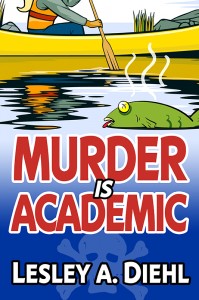 Our guest post today comes from Lesley Diehl, a retired professor of psychology. She splits her time between upstate New York where she and her husband are renovating an 1872, ghost-inhabited cottage, and old Florida where spurs still jingle in the post office and gators make golf a contact sport. Today, she asks the question, Bury that manuscript in a drawer or rewrite it?
Our guest post today comes from Lesley Diehl, a retired professor of psychology. She splits her time between upstate New York where she and her husband are renovating an 1872, ghost-inhabited cottage, and old Florida where spurs still jingle in the post office and gators make golf a contact sport. Today, she asks the question, Bury that manuscript in a drawer or rewrite it?
The Self-publishing Jitters
Here’s the dilemma. Open up the file on that old manuscript you never got published, read it, and send it to the trash bin, or at least, file it under “yuk!” and forget it. Or you could read it through, realize how bad it really was, heave a sigh of relief that it never was published, saving you the embarrassment of all those one star reviews, and then… Read it again. Maybe the characters were interesting, but need more depth. Their motivation for trying to solve the crime may be weak. Perhaps the plot is thinly drawn, too simplistic or too convoluted for a reader to follow. The pacing may be too slow and more tension is required to keep the reader’s interest. You could rework it. Naw! But before you press the delete button, reconsider. I did.
Here’s my confession. I took the very first manuscript I wrote, and began revising it several years ago, using the time between writing others to work on the old one. I had several readers take a look at it, I revised again, and just this month I published it. And, yes, I wake up in the middle of the night wondering if I should locate the “unpublish” button and press it. Of course I’m nervous about this work. It was my first attempt at a mystery. I have a blog tour for it coming up in May. Until then I probably won’t know how readers will receive it. I’m taking a chance, and I know it, and I’m terrified.
Write what you know is always sage advice, so I did just that. This book is taken from my life before writing, when I was a faculty member and administrator at several colleges and universities. I spent over 25 years in academie, so it’s familiar to me. I loved being in the classroom, and I loved doing collaborative research with my students. But like any other place trying to survive in a world where resources are becoming scarce, institutions of higher learning are competitive environments where faulty vie for promotions and they don’t trust administrators any more than administrators trust them. Having been on both sides of the fence, I know how difficult life on campus can be.
Given the atmosphere of the college campus, is it any wonder that, in my first attempt at fiction I killed off a college president and then took down one of the faculty? To my credit, when I reworked the manuscript I reduced it from over 100,000 words to around 70,000. Most of those words were located in long convoluted sentences that described in too much detail the inner life of faculty and staff. I left students alone. They suffer enough trying to pass their courses and pay their tuition. Not that students are angels, but later, I said to myself, and that’s just what I did. The sequel to the book has my protagonist take on bad frat boys.
Here’s a short description of Murder Is Academic:
 Laura Murphy, psychology professor, thinks there’s nothing she likes better than coffee and donuts on a summer morning until she says yes to dinner with a Canadian biker and finds herself and her date suspects in the murder of her college’s president. Laura’s friend, the detective assigned the case, asks her to help him find out who on the small upstate New York college campus may be a killer. The murder appears to be wrapped up in some unsavory happenings on the lake where Laura lives. A fish kill and raw sewage seeping into the water along with the apparent drowning suicide of a faculty member complicate the hunt for the killer. And then things become personal. The killer makes a threatening phone call to Laura. With a tornado bearing down on the area and the killer intent upon silencing her, Laura’s sleuthing work may come too late to save her and her biker from a watery grave.
Laura Murphy, psychology professor, thinks there’s nothing she likes better than coffee and donuts on a summer morning until she says yes to dinner with a Canadian biker and finds herself and her date suspects in the murder of her college’s president. Laura’s friend, the detective assigned the case, asks her to help him find out who on the small upstate New York college campus may be a killer. The murder appears to be wrapped up in some unsavory happenings on the lake where Laura lives. A fish kill and raw sewage seeping into the water along with the apparent drowning suicide of a faculty member complicate the hunt for the killer. And then things become personal. The killer makes a threatening phone call to Laura. With a tornado bearing down on the area and the killer intent upon silencing her, Laura’s sleuthing work may come too late to save her and her biker from a watery grave.
So, as I bite my nails and lose sleep over how this work will fare, I’d sure like to hear if others have revamped old work and then published it. Were you as anxious about doing it as I was? And how did it turn out for you?
Jim: Thanks, Lesley, for sharing your feelings on this. I hope you get some good comments on what to do with those old manuscripts.
Lesley has three mystery series in print: her microbrewing series, the rural Florida series, and the Eve Appel series. I can vouch for her books. You can buy them at:
http://www.amazon.com/dp/B00JCV6XG8
http://store.untreedreads.com/Books/UTR9781611879414

Lesley, thank you for the post…I’ve revised and revised over and over again on one manuscript only to realize the craft was not quite there. This time I got it! after writing countless of other hours on other pieces. I’m like Eileen (never throw anything away), but today I’m purging the clutter of tiny little trees…there’s something there.(lol) augie
Very good post, Leslie. I’m always telling students not to throw away those old drafts — you just never know if you’ll want to hit the “refresh” key. I have several unpublished novels buried in the drawer, and that’s where they’ll probably stay. But there are another two books — one a memoir, one a short novel — that keep beckoning me to take them out and give them another try. I may do that eventually. Thanks, Jim, for hosting Leslie.
Thanks for all your best wishes hugs. From what many of you say, revising old work is not uncommon, and it looks from your responses that it sometimes surprises, delights and does well.
My first attempt at writing a mystery was a total loss. The only thing that worked about it was that I used the title in a story about a writer. : ) I rewrote my second book, Secrets of Holt House, changed the title to Mysteries of Holt House, and “indy” published it. It’s done surprisingly well, and am I ever surprised! You just never know.
I wish you the best with your book. I thoroughly enjoy your books, so I’m sure it will do very well.
My first book,Black Cat’s Legacy, was rewritten several times over the past few years, and published this month. I’ve written short stories for many years, and often pull them from the drawer. I’ve learned much more about the craft of writing then when the story first appeared on my ‘typewriter.’ Nothing wrong with pulling out old material as long as you continue to work on new at the same time.
Lesley,
I’ve already put “Murder is Academic” on my TBR list.
Although I’ve never pulled an old novel manuscript out of a drawer (my first two novels weren’t mysteries and didn’t hold my interest long enough for me to finish them) and rewritten it, I do have a couple of short stories written a long time ago that I’ve considered incorporating into a book. Maybe, like you, I’ll get around to doing that one of these days.
Best of luck with your “new” book!
Not yet. I’m not sure I’ll ever take out that first manuscript and make it publishable. There are others, however, that I do remember fondly. Right now, I’m too busy working on two current series to go back in time.
It sounds like you’ve done exactly the right thing with this book. It’s not the same book you left in a drawer. I wish you luck.
Oh, and this is the thing that made me push the Publish button on the first in one series: http://kriswrites.com/2012/06/27/the-business-rusch-perfection/
It wasn’t my first ever, but the first that I tried really, really hard to get an agent for (the 3rd, actually) was rewritten and sent out to small press last year. Barking Rain Press published Eine Kleine Murder and made me very happy! The manuscript was so old I had to take out the pay phones and add cells and computers. In the meantime, I had self-published 3 in another series. You do what you can, eh?
Best of luck with this project!
Years ago I wrote several manuscripts that never saw the light of day. They’ve disappeared–and it’s probably a good thing.
Great post, Leslie! Yes, the thing is: usually we had a bang-up idea for that first mystery book. It’s just that our craft wasn’t well-developed then. I look back at my first published book (which wasn’t the first book I wrote) and think, even now, that I wish I could rewrite it. I would do it better today. Now only if I could find that floppy disc…
So many writers told me about manuscripts still sitting on their computers or buried in desk drawers that I worried I was doing something quite idiotic by publishing this. I thought perhaps one should have a few old moldy works that were too embarrassing to bring to light. Gosh I hope I’m wrong.
I’m thinking it’s a very good think you rewrote.
Lesley I had a completed mss and went on to the second in my series set in England. Then an agent told me the second was much stronger than the first one, still not in print, so I rewrote it and made it into the first in the series. Later on I went back and took that first one out of the drawer and rewrote IT to be the second in the series. The third comes out this May (The Nora Tierney Mysteries). I say there’s always something retrievable from your efforts. P D James told me once that “the real writing gets done in revision” and I have taken that to heart.